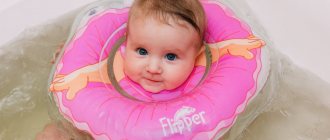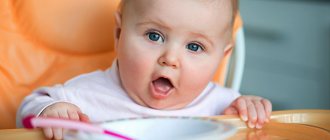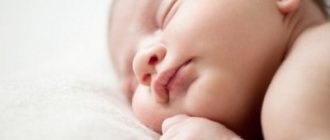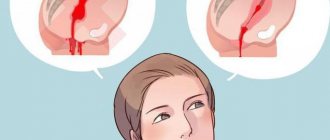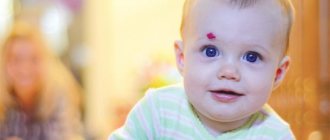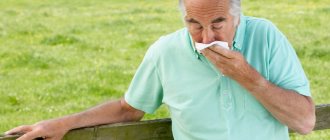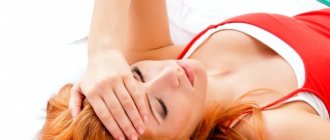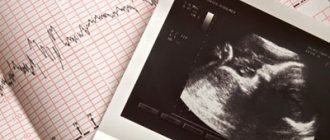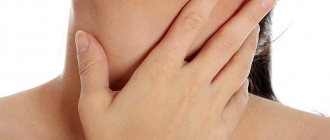Medical devices
- Thermometer for measuring temperature. Now there are many thermometers that are safe and easy to use. There are: infrared non-contact thermometer, electronic pacifier thermometer, thermometer in the form of a sticker on the forehead, etc.
Infrared thermometer
- electronic nipple thermometer
Thermometer sticker
- Syringe No. 1, 25 ml for enemas.
- Gas outlet tube No. 1 for removing gases during intestinal colic.
Gas outlet tube Heating pad for colic and abdominal pain
- Anti-colic heating pad to relieve abdominal pain.
- Aspirator for collecting snot.
Aspirator for collecting snot
- A dosing syringe or measuring spoon for dosing medications.
- A pipette with a rounded end in a case for instilling medications into the ears and nose.
- Small scissors with a rounded tip or forceps.
Medicines
Before purchasing medications and treating your baby, read the attached instructions for the medications, and always consult your pediatrician; do not prescribe medications for the little ones on the advice of neighbors and grandmothers.
Carefully observe the frequency of administration and daily dosage, and monitor the expiration date of the medications.
Next, we will consider the main medications that may be useful in the first months of a child’s life.
- Antipyretic agent in suppositories or in liquid form: Nurofen and Panadol (from 3 months), Efferalgan (from 1 month) or Ibuprofen (from 6 months)
- Antihistamines to relieve allergic reactions: Fenistil (from 1st month), Suprastin.
- Remedies for intestinal colic: Espumisan, Plantex, Bobotik, Sab simplex, dill water.
- Remedy for diarrhea: Smecta, Linex, Bifidumbacterin.
- Anti-poisoning agent: Activated carbon, enterosorbents.
- Medicines for constipation: Microlax, suppositories with glycerin, Duphalac, etc.
- Drops for runny nose in spray form: Aqualor Baby, Aquamaris, Quix, etc.
- Interferon in powder, nasal drops or suppositories to strengthen the immune system during illness.
- Teething Pain Relief Gel: Dentinox, Kamistad, Kalgel, Cholisal, cooling water teether for gums and teeth that can be stored in the refrigerator.
- Vitamin D solution: Aquadetrim or Vigantol (used in winter to prevent rickets)
- Medicines for the treatment of conjunctivitis: Furacilin solution, Albucid eye drops.
- Creams for diaper dermatitis and diaper rash: Bepanten, Drapolen, Desitin, Purelan, Tsindol or D-panthenol.
- Remedy for oral thrush: Candida solution 1%.
Remember that medicines must be stored away from sunlight, in a cool place and out of the reach of children. There should be no high humidity; in a humid environment, fungi develop, medicines become damp and spoil.
List of necessities for a newborn's first aid kit for nature travel
A first aid kit for a newborn (the list of necessities must be drawn up taking into account various situations) should contain drugs that may be useful while traveling or outdoors. The baby's immunity is not yet able to cope with all external threats.
Therefore, parents should take care of everything that may be needed:
- first aid for bruises, abrasions, wounds. Of course, newborn babies may not need them, but it’s better to have everything at hand. You need to make sure you have sterile cotton wool, bandages or gauze, plasters, brilliant green, iodine and hydrogen peroxide;
- cold medicines. On the road, even in the hot season, a child can catch a cold. Therefore, the first aid kit should contain antiviral drugs (Viferon), drugs to reduce fever (Efferalgan), and non-steroidal anti-inflammatory drugs (Ibuprofen). You also need to have drops for a runny nose (Aquamaris) and for ear pain (Otipax). If a cough appears, be sure to show the child to the doctor;
- remedies for gastrointestinal disorders and poisoning. In countries where the climate, food and water are different, such situations are not uncommon. Bactisubtil is effective for diarrhea. This medicine is safe for babies. To restore intestinal microflora, you can take Linex. Babies often experience constipation after diarrhea. Duphalac, approved for use by newborns, will help with them. In case of vomiting associated with poisoning, you will need Regidron to normalize the water-salt balance. Also, do not forget about anti-colic remedies (Plantex, Espumisan);
- burn creams (Panthenol). To avoid such a problem, you need to ensure that the baby is not in direct sunlight;
- antihistamines (Diazolin). With climate change, many children develop allergic reactions from exposure to sunlight. The drug Edem will help eliminate them;
- medicines for insect bites (Fenistil-gel);
- If your baby is teething , you should take Kalgel with you.
When traveling with your baby to hot countries, it is advisable to purchase a thermal bag for storing medications. Medicines should be stored at a temperature of no more than 25°C. Parents may wonder why they should pack a first aid kit for travel if medications can be purchased everywhere.
There are several reasons for this:
- if you are planning a trip to a previously unfamiliar place, then you won’t be able to quickly find a pharmacy;
- in some cases the medicine may be needed at night;
- Medicines may cost more abroad. In addition, they have different names, and even without knowledge of the language it will be difficult to understand the instructions;
- Many medications abroad are available only by prescription.
Hygienic care products
- Baby bath soap. For convenience, you can purchase liquid soap with a dispenser.
- Baby diaper cream, moisturizing cream, massage oil.
- The powder is used before putting on the diaper.
- Sterile cotton wool for cleaning the ears, nose, and navel.
- Cotton swabs with a limiter for treating umbilical wounds, pimples, and bites with antiseptics.
- Baby wet wipes for quick.
- Cotton pads for hygiene procedures.
- Antibacterial plasters, gauze, bandages.
Components of a first aid kit
Everyone knows that pharmacies sell ready-made first aid kits. But their composition is not entirely suitable for newborn babies, or rather, they do not contain everything necessary. Therefore, it is worth finding out exactly what your baby will need and what should be in a first aid kit for a newborn.
- Means for treating umbilical wounds and more.
- Hygiene products.
- Medications for newborns.
- Accessories for baby care.
These 4 components of a first aid kit should definitely be on hand.
Means for treating umbilical wounds
As you know, a baby’s belly button does not heal immediately. Therefore, you will need to treat it daily with special products. Therefore, a children's first aid kit should contain the following disinfectants.
- Hydrogen peroxide.
- Zelenka, iodine or chlorophyllipt. The last remedy is most recommended because it does not burn the baby’s skin at all.
- Medical alcohol.
- Potassium permanganate. In addition to the fact that a diluted solution of manganese can be used to treat the umbilical wound, it can also be added to the bath when bathing a newborn. You just need to carefully dissolve a few crystals of potassium permanganate in a separate bowl, strain through cheesecloth, and only then add it to the baby’s bath.
- Bactericidal patch. It is not advisable to tape the belly button, but this item should be in every baby’s first aid kit.
Hygiene products
To properly care for delicate baby skin, you need to have a number of hygiene products on hand.
- For children's soap, it is better to give preference to liquid soap. It is suitable not only for bathing, but also for frequent washing of the child.
- Baby cream. Many mothers leave their choice to the simplest baby cream, which can be bought at any pharmacy.
- The first aid kit should also include wound healing ointment. For example, Bepanten, Purelan, D-Panthenol, etc., will allow you to quickly cope with diaper dermatitis, diaper rash and any skin irritations. They can also be used by nursing mothers to heal cracked nipples.
- Baby powder. This item should also always be at hand, because at first the baby is almost constantly in diapers and the mother has to change them often.
- Vaseline oil. With this oil you can soften the crust on the baby’s head and treat the nose and ears. Many parents also use it as a moisturizer.
- Massage Oil.
- Cotton swabs and disks. They are useful not only for treating a newborn’s navel, but also for many other hygiene procedures. And cotton swabs with a limiter are suitable for cleaning baby’s ears.
- Cotton buds and cotton wool. You can safely clean your baby's ears and nose with them. The mother should be told about how to clean the nose using flagella while still in the maternity hospital.
- Wet wipes. This necessary attribute of hygiene helps not only at home and on a walk. Therefore, it is best to stock up on napkins in advance.
Medications
There are quite a lot of medications that you may need at first. But all of them should be used only after consultation with a doctor. Giving any medication yourself is extremely dangerous. Every mother of a baby should remember this.
So, the list of medications for a newborn includes:
- Medicines for intestinal colic and increased gas formation. Among them are Plantex, Espumisan, Baby Calm, Bobotik, Smecta. Dill water can also help with colic.
- Antipyretics. Among such drugs are Panadol, Cefekon, Efferalgan, Nurofen. You can purchase these drugs in various forms - syrups, suspensions, suppositories. The latter act the fastest.
- Cold drops. Babies whose immunity has not yet developed often experience nasal congestion. Therefore, you need to purchase drops such as Aquamaris, Nazivin, etc.
- Antihistamines. These funds are needed not only for children prone to allergies, but also for children who are about to receive vaccinations, as a preventive measure for complications. Among these medications, Suprastin, Tavegil, Fenistil, etc. can be noted.
- Remedies for diarrhea - Smecta.
- Remedy for constipation - microenemas, suppositories, etc.
- Drugs against viral infections. If a flu epidemic has begun, then the baby needs to be given preventive medications, for example, Interferon.
- Furacilin. In an infant, you can use furatsilin solution to treat the eyes for conjunctivitis.
- Vitamin D.
- Local anesthetics. These include various gels to facilitate teething - Kamistad, Kalgel, etc.
Baby care accessories
First aid kits for a newborn must contain a lot of useful and even necessary accessories.
- Thermometer for measuring temperature. This can be a regular mercury thermometer (the most accurate) or an electronic one (very convenient, but can slightly “deceive”).
- Thermometer for measuring water temperature.
- Scissors with rounded ends. You will need them to safely trim small nails.
- Pipettes. If you need to drop medicine into your baby’s nose, you simply cannot do without this accessory.
- Nasal aspirator. As already mentioned, babies often suffer from a runny nose. Therefore, a newborn’s first aid kit, the list of which is very impressive, should also contain a device for removing sniffles.
- Measuring syringe or spoon with dispenser. Many medicines can find these items in the package, but it is better to have several in stock so that you can correctly measure the required dose of the medicine if necessary.
- Gas outlet tubes. If the baby has severe colic, then gas remedies may not work immediately, so a gas tube will be a quick solution to the problem.
- Warmer. In addition to the usual heating pads, which can be filled with water and applied to the baby’s tummy, today you can also purchase a self-heating one.
- Napkins and bandages.
- A comb or a special children's comb. These devices are convenient for combing crusts from the baby’s head.
